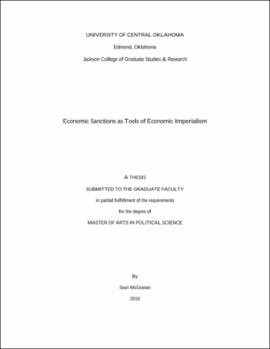| dc.contributor.advisor | Furmanski, Louis S. | |
| dc.contributor.author | McGowan, Sean | |
| dc.date.accessioned | 2020-07-09T14:40:19Z | |
| dc.date.available | 2020-07-09T14:40:19Z | |
| dc.date.issued | 2018 | |
| dc.identifier.other | (AlmaMMSId)9982594585002196 | |
| dc.identifier.uri | https://hdl.handle.net/11244/325081 | |
| dc.description.abstract | Economic sanctions have come under scrutiny in recent political scholarship. Sanction regimes are analyzed for effectiveness, intended targets, and societal impact. The theory of liberal internationalism greatly influences economic policy, foreign policy and diplomacy. Liberal internationalism can be summarized by one basic premise: states care what other states think. This shared notion has spawned a myriad of international organizations and is the lifeblood of the United Nations. The United Nations constructs norms and shared goals, presenting the consensus of a collective hegemony. Economic sanctions are a construct used to impose the general will. Little concession is made for countries that deviate from emerging norms. Historically, this aberration could be remedied by the 'might makes right' method of military force. To some degree, this military option is still in play, though it is widely discouraged by international norms. The preferred method of punishing rogue statecraft is economic sanctions, predicated on the assumption that global trade benefits all and is desired by even the most autocratic regimes. But economic punishment through sanctions can have similar effects to military action, both in the impact on civilian population and in long term financial standing of the targeted regime. Sanctions have devastating effects politically and economically, and thus seem inconsistent with a theory predicated on equality and fairness. The only mechanism protecting minority rights is the U.N. Security Council veto, which still requires the powerful to favor the marginalized over the groupthink of the international community. Sanctions stigmatize and demonize bad actors, and targeted states and individuals may find it takes decades to claw back to somewhat equal footing with the rest of the world community. The United Nations is defined by principles of liberal internationalism, and sanctions are employed to keep states in line with shared norms and goals. Despite their coercive nature, sanctions provide a useful tool that ultimately supports global liberalism. | |
| dc.rights | All rights reserved by the author, who has granted UCO Chambers Library the non-exclusive right to share this material in its online repositories. Contact UCO Chambers Library's Digital Initiatives Working Group at diwg@uco.edu for the permission policy on the use, reproduction or distribution of this material. | |
| dc.subject.lcsh | Economic sanctions | |
| dc.subject.lcsh | Internationalism | |
| dc.subject.lcsh | Liberalism | |
| dc.subject.lcsh | Imperialism | |
| dc.title | Economic sanctions as tools of economic imperialism. | |
| dc.type | Academic theses | |
| dc.contributor.committeeMember | Hardt, Jan | |
| dc.contributor.committeeMember | Kiggins, Ryan | |
| dc.thesis.degree | M.A., Political Science | |
| dc.subject.keywords | Economic | |
| dc.subject.keywords | Global | |
| dc.subject.keywords | Imperialism | |
| dc.subject.keywords | Internationalism | |
| dc.subject.keywords | Liberal | |
| dc.subject.keywords | Sanctions | |
| dc.identifier.oclc | (OCoLC)1041188821 | |
| uco.group | UCO - Graduate Works and Theses::UCO - Theses | |
| thesis.degree.grantor | Jackson College of Graduate Studies. | |
